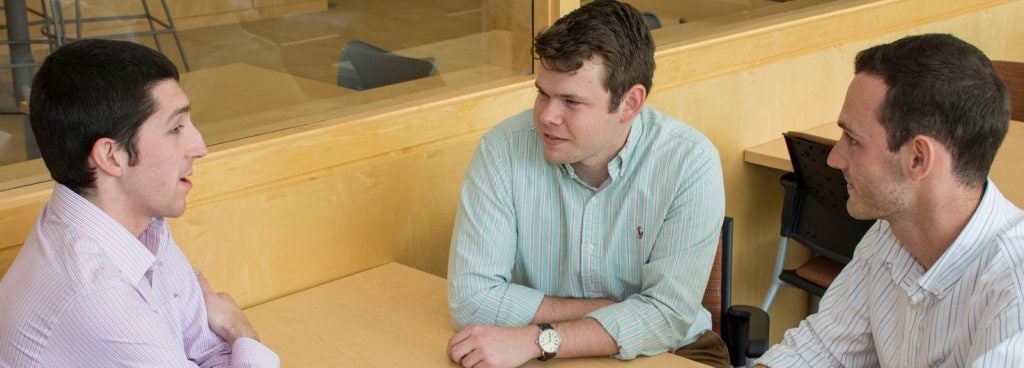
Who says you have to wait until you have your degree to launch your career? Three College of Pharmacy Ph.D. students with an entrepreneurial spirit have proven otherwise.
Nicholas DaSilva, Kenneth Rose and Benjamin Barlock founded Alcinous Pharmaceuticals, a company that harnesses big data in a novel approach to drug development, in late 2016. David Worthen, a former College of Pharmacy faculty member and longtime pharmaceuticals consultant, is chief operations officer.
“We have always had an entrepreneurial spirit,” said Rose. He and DaSilva had often discussed combining their interest in science with a business venture.
DaSilva, chief executive officer; Rose, chief scientific officer; and Barlock, chief technology officer, have invested countless hours to the startup, working at home on nights and weekends while pursuing their Ph.D.’s. “We are grad students by day and executives by night,” DaSilva said.
Alcinous uses computational software available free on the Internet to sort through 40 million possible drug-binding targets. Calling on their knowledge of chemistry and pharmacology, the students selected five non-traditional protein binding targets for drug action. “We identified them by conducting extensive literature reviews and using binding-site prediction software,” Rose said.
You could say their approach is not a case of man vs. machine, but man and machine.
Alcinous is looking to develop new drug therapies for breast and ovarian cancers caused by the BRCA1 and BRCA2 gene mutations, targeting a class of oncology drugs known as Poly ADP-Ribose Polymerase inhibitors or PARP inhibitors. These drugs are typically a third line of defense, given their severe side effects. DaSilva and Rose believe that by looking at highly specific and uninvestigated binding targets, Alcinous can develop compounds that are safe and highly effective with fewer side effects.
DaSilva said there is strong precedent for their strategy. Small firms are increasingly handling the first stages of drug development, thanks to improvements in technology that can mine big data without the need for a large staff. These companies gain the attention of big pharmaceutical companies, which can get the drug to market.
While still in the pre-clinical research phase, Alcinous is courting private investors to help the company advance to in-depth clinical research in the next year or two and is pursuing state innovation grants and biotechnology incentives. In fact, the resources and expertise found at URI and across Rhode Island are reasons why the students chose to incorporate Alcinous here, DaSilva said.
